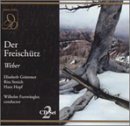| All Artists: Carl Maria von Weber, Wilhelm Furtwängler, Wiener Staatsopernorchester, Alfred Poell, Claus Clausen, Elisabeth Grummer, Hans Hopf, Karl Donch, Kurt Böhme, Oskar Czerwenka, Otto Edelmann, Rita Streich Title: Weber: Der Freischutz Members Wishing: 1 Total Copies: 0 Label: Opera D'oro Original Release Date: 1/1/1954 Re-Release Date: 8/7/2001 Genre: Classical Styles: Opera & Classical Vocal, Historical Periods, Modern, 20th, & 21st Century Number of Discs: 2 SwapaCD Credits: 2 UPC: 723724150720 |
Search - Carl Maria von Weber, Wilhelm Furtwängler, Wiener Staatsopernorchester :: Weber: Der Freischutz
 | Carl Maria von Weber, Wilhelm Furtwängler, Wiener Staatsopernorchester Weber: Der Freischutz Genre: Classical
|
Larger Image |
CD Details |
CD ReviewsA "Freischutz" for the ages madamemusico | Cincinnati, Ohio USA | 11/06/2003 (5 out of 5 stars) "Weber's "Der Freischutz" is an opera that has never really done well with American audiences. Apparently there is just something very "Gremanic" about it that seems offputting, but in all honesty (as this recording proves) what it really needs is a firebrand conductor who can bring the music to life with both theatricality and musical authority.Wilhelm Furtwangler was just such a conductor and, as any of his numerous fans know, he always operated best in a "live" setting. His 1950 La Scala "Ring" has more fire than his 1953 RAI-concert performance "Ring" (though there are several misfires among the performers, most notably Set Svanholm whose Siegfried runs out of voice halfway through the great duet with Kirsten Flagstad), just as the RAI "Ring" has more fire than his studio recording of "Die Walkure" with much the same cast. And, though his great "Tristan und Isolde" recording is eclipsed vocally by the 1936 Covent Garden performance under Reiner and the 1974 Orange Festival performance with Nilsson and Vickers, it is still a model on how to conduct "Tristan" with passion and elegance.This "Freischutz," which I believe was the last opera production he worked on before his death (it was in July 1954), has one very serious flaw, the heavy, beefy tenor of Hans Hopf, who for some reason was a big favorite in Germany during those years. But this is like dismissing the Toscanini "Aida" because Eva Gustavson is an awful Amneris, or the Gergiev "Boris" because Vaneev does not have as glorious a voice as Christoff. This is missing the point, for Furtwangler pulls all the various strands of "Freischutz" together as no other conductor has done. He is alternately brooding, elated, dramatic and loving in turn as the music demands. This is a true conducting tour-de-force.Aside from Hopf, the cast is very good. The great soprano Elisabeth Grummer, heard here in her glorious prime (rather than thin-voiced as she is in the Kempe "Lohengrin"), is a stunning Agathe. The great basso Kurt Bohme is Kaspar, character baritone Alfred Poell is Ottokar, and in a bit of luxury casting we get the legendary coloratura Rita Streich as Annetta. Furtwangler always had a special touch with the Vienna Philharmonic, and here they respond with some of their best playing on records. (Then again, I've noticed over the years that Furtwangler, like Toscanini, could draw outstanding playing out of almost any orchestra, as witness the La Scala and RAI "Rings").Except for the lack of a libretto (easily corrected if you can borrow a more modern set from the library and follow along with it), this is a real "buy." Once you hear it, I guarantee you won't want anyone else's "Freischutz.""
|

 Track Listings (11) - Disc #1
Track Listings (11) - Disc #1